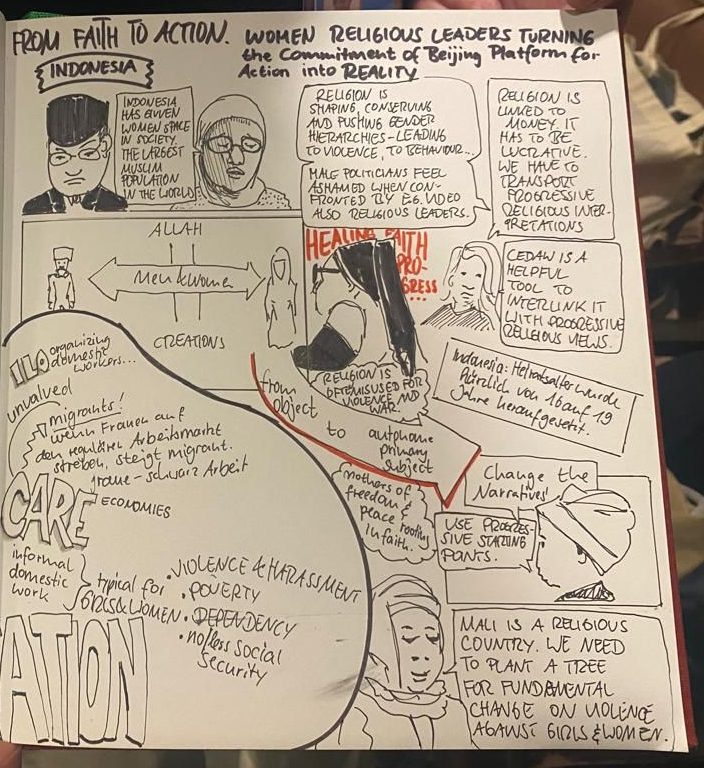Blog
Reflections from CSW69: Women of Faith Bridging Divides for Peaceful and Inclusive Societies
A reflective piece by Gina Dias, Regional Manager for Africa at the Network for Religious and Traditional Peacemakers, on the ‘Joint Initiative for Strategic Religious Action’ (JISRA) Project mission to the 69th Commission on the Status of Women in New York City.
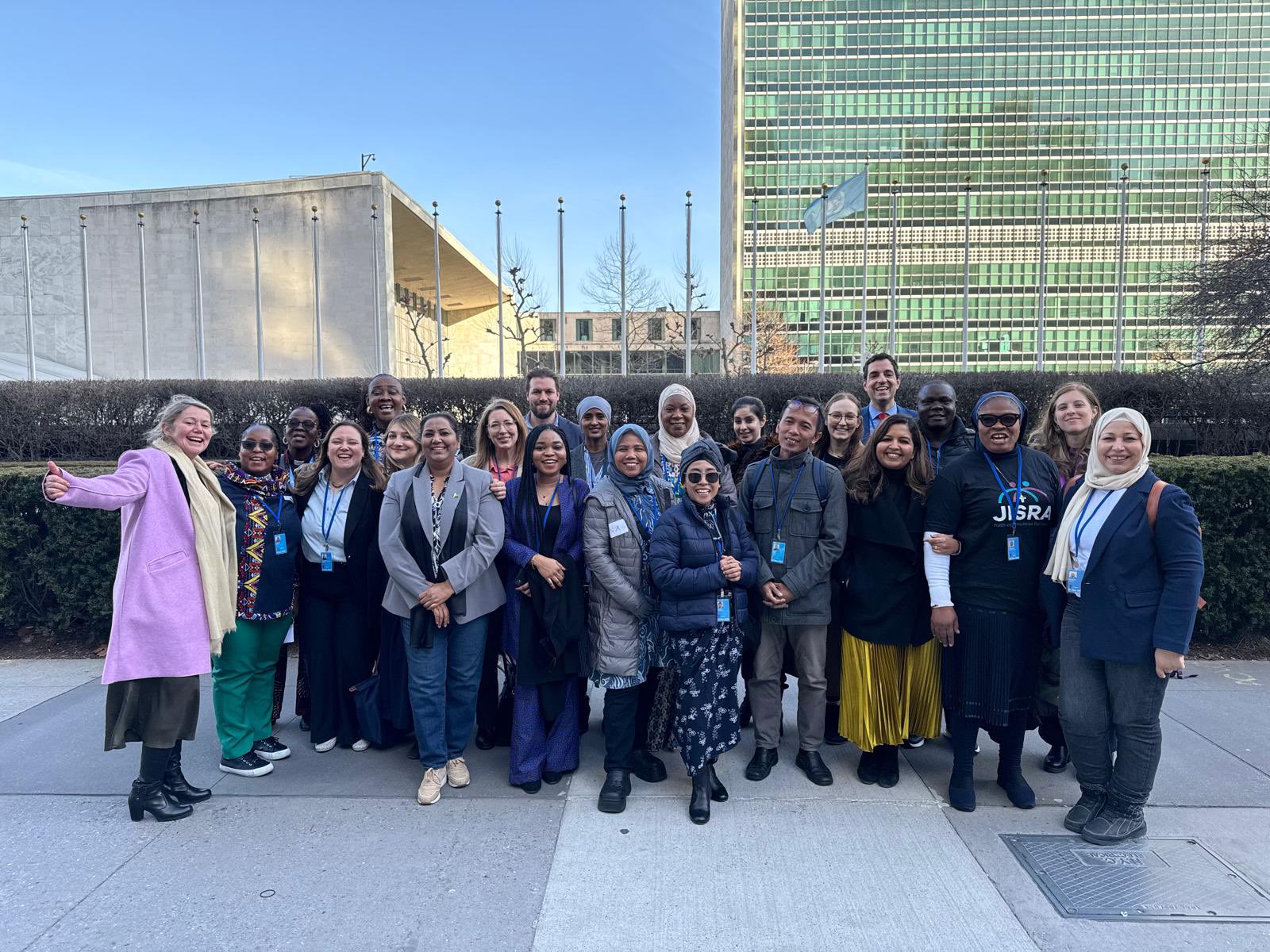
JISRA CSW69 Delegation outside the United Nations headquarters in New York. March 2025.
From the 10th to the 17th of March 2025, I had the privilege to accompany a delegation of faith-based actors to the 69th in New York, as part of the Joint Initiative for Strategic Religious Action (JISRA) project. JISRA is an international, interreligious partnership, supported by the Dutch Ministry of Foreign Affairs, comprising of 50 civil society organizations across Ethiopia, Indonesia, Iraq, Kenya, Mali, Nigeria, and Uganda (with advocacy work in Europe and the USA). JISRA works to advance peaceful and just societies where all individuals enjoy Freedom of Religion or Belief (FoRB). JISRA partners and consortium members including Mensen met een Missie, the Network for Religious and Traditional Peacemakers, Tearfund, and the Faith to Action Network; have played a transformative role in shaping inclusive policies, advocating for gender-responsive reforms, and fostering interfaith collaborations that advance gender equality and human rights.
In 1995, 189 governments unanimously adopted the Beijing Declaration and Platform for Action. It became the most comprehensive and visionary agenda ever for gender equality and the human rights of all women and girls, holding the key to more peaceful, prosperous, and inclusive societies for everyone. This year, the focus of CSW was on reviewing and appraising the implementation of the Beijing Declaration and Platform for Action on the thirtieth anniversary of their adoption.
While much progress towards achieving gender equality has been made in the past 30 years, the current situation is grim. A global backlash on women’s rights in recent years has rolled back gains achieved in legislation, leadership, education, and representation. Since 2010, there has been a 54 percent increase in the number of women and girls living in conflict. Unsurprisingly, global military expenditure reached an all-time high in 2023, double what it was 30 years ago. Panelists at two CSW side events on Sudan highlighted how the ongoing two-year war has been fought on the bodies of women with unprecedented levels of sexual and gender-based violence experienced by women and girls across the country. This reflects the global data indicating that conflict related to sexual violence has increased by 50 percent since 2022. The sessions also emphasized how despite Sudanese women being pivotal to the revolution of 2019, they were sidelined in the subsequent state formation and stalled peace negotiation processes. Around the world, women and girls are disproportionately impacted by war, yet women were only 14% of mediators in peace agreements in 2023.
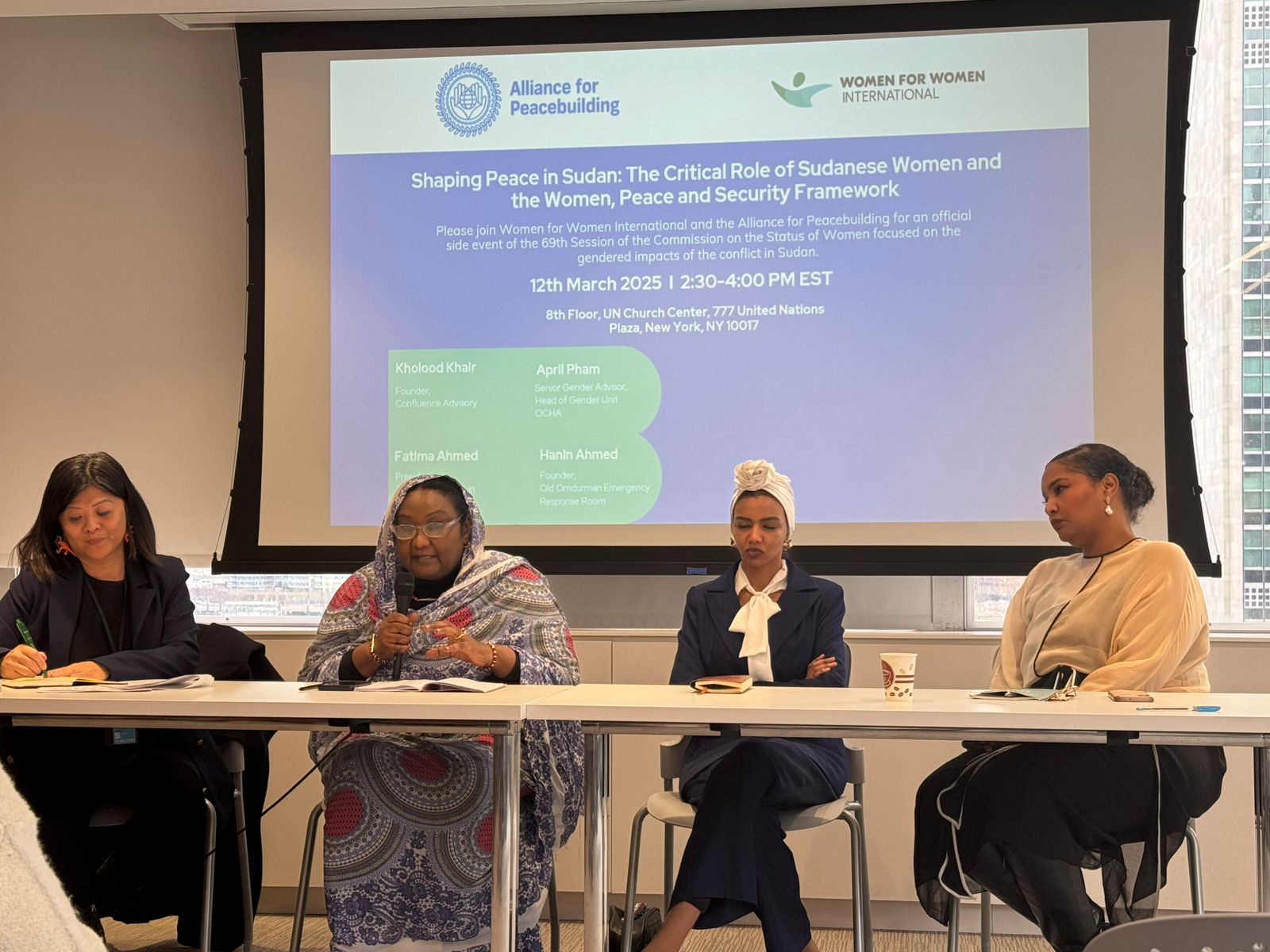
Panelists at a side event organized by the Alliance for Peacebuilding and Women for Women International on the role of Sudanese women in peacebuilding. March 2025.
Women faith–based actors are often at the forefront in responding to the impacts of war, displacement, sexual and gender-based violence, as well as harmful traditional practices. During the JISRA official side event organized together with the government of Indonesia, Sr. Veronica Ifeyinwa Onyeanisi from the Peacemaker’s Network member Women’s Interfaith Council in Nigeria, shared how women have been at the forefront of building peace between religious communities, mediating in farmer-herder conflicts, and challenging narratives promoted by extremist groups and those misusing religion for political gain. Sr. Veronica called upon governments to recognize women of faith as peacebuilders and mediators from local to global levels.
An illustration of the conversations that took place during the Indonesian Official CSW Side Event. March 2025.
In addition to their roles as peacebuilders and mediators, women of faith are also playing a crucial role in addressing gender inequality. In Indonesia for example, women religious scholars are reclaiming religious authority by formulating policies based on women’s lived experiences as the basis of religious doctrine. Dr. Nur Rofiah from the Indonesia Women’s Ulema (KUPI) and Ruby Kholifa from the Peacemaker’s Network member Asian Muslim Action Network (AMAN) shared about their work which led the Indonesian government to adopt as policy three fatwas issued by KUPI against child marriage and Female Genital Mutilation (FGM), and facilitating access to sexual and reproductive health services. By fostering inclusive interpretations of religious texts, women of faith challenge the notion that religion is an obstacle to equality, instead using it as a tool for reform. Listening to Nur and Ruby reinforced my convictions about the transformative potential of engaging women faith-based actors in driving both social and legislative change.
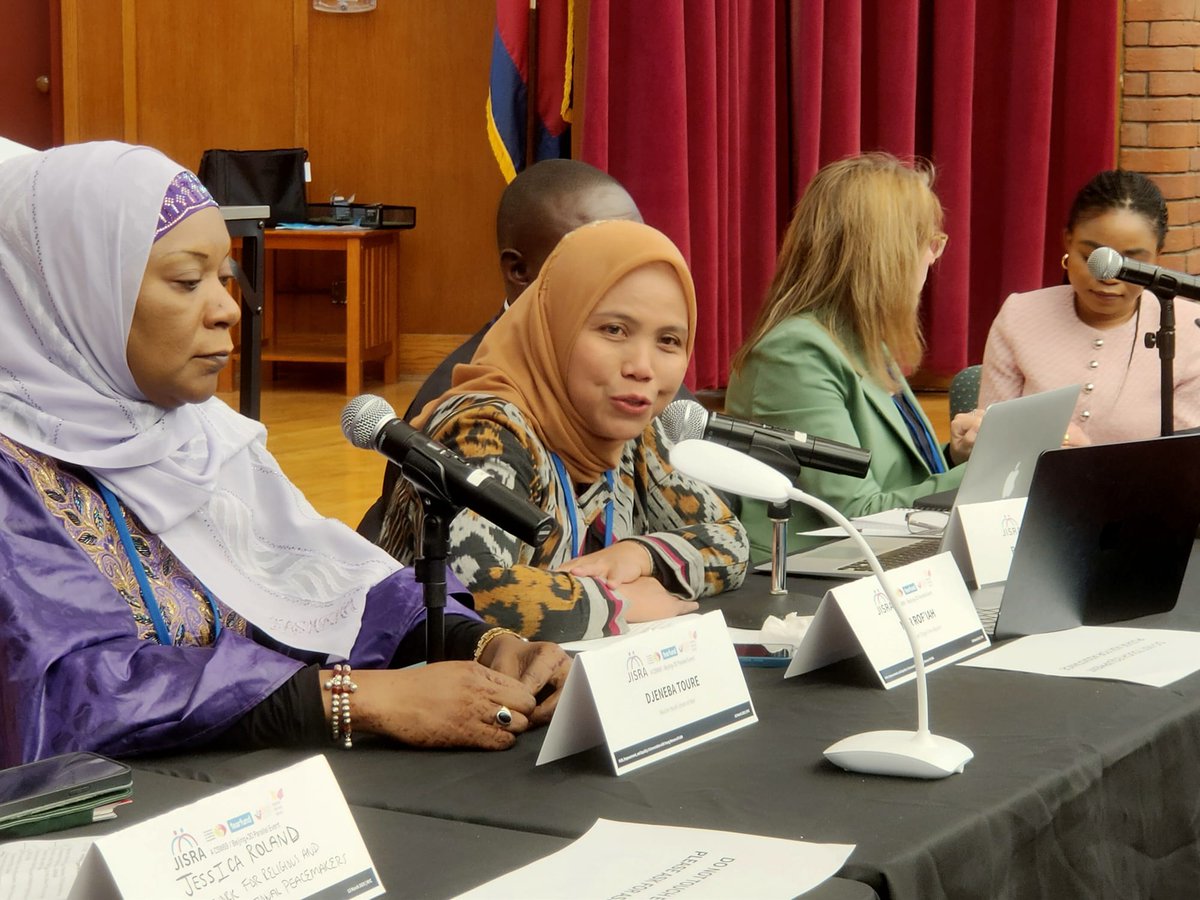
Dr. Nur Rofiah speaking at the CSW JISRA parallel event. March 2025.
At the JISRA parallel side event, Rev. Dominic Misolo from the Institute for Faith and Gender Empowerment (IFAGE) in Kenya, shared a powerful personal story about how he began his work as an advocate for gender equality. Growing up witnessing domestic violence at home, he came across a biblical article which changed his perspective by helping him understand patriarchy. Rev. Dominic shared that as a man advocating for women’s rights, he often feels lonely. However. he emphasized that the world is thirsty for women’s leadership and gender equality, for which more male allies, especially male religious leaders, are essential.
As highlighted by speakers during the Multi-Faith Reception on Gender Equality and Empowerment event organized by JISRA, the current political climate is facing a very well-organized and well-funded backlash against women’s rights using religion to justify regressive positions and laws. To counter the backlash, religious actors are well positioned to use religious texts to offer theologically based counternarratives focused on human rights, justice, and equality for all. During her opening remarks at the roundtable event organized by JISRA together with UNDP, the Dutch government, and the government of Somalia; Shoko Noda, UN Assistant Secretary-General, UNDP Assistant Administrator, and Director of the Crisis Bureau, noted that faith is a powerful source of social transformation reaching into the hearts of people in ways that policies cannot. In the face of pushback and setbacks (including recent funding cuts from the US government), women of faith have not stepped back, but have stepped up. They are not just asking for a seat at the table but are rebuilding the table.
In my closing remarks at the same event, I stressed that in these times of heightened global instability, we call upon the international community to continue to support the important and essential work of women faith actors through increased access to resources, financing, and policy reform.
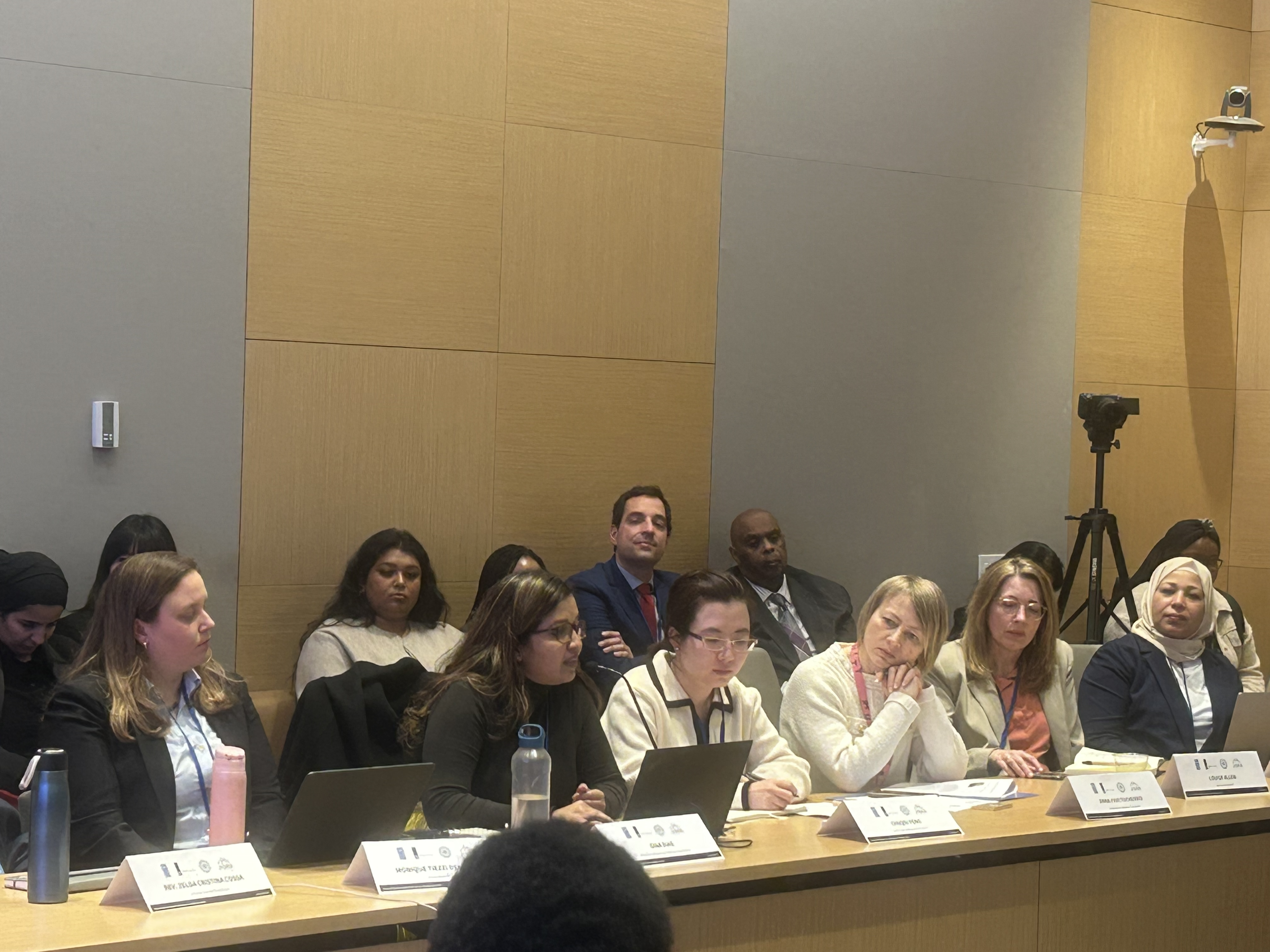
Gina Dias providing the closing remarks at the JISRA roundtable organized with UNDP, as well as the Dutch and Somalia Governments. March 2025.
This was my first time at CSW and despite the current political climate, it was invigorating to be amongst such powerful and inspirational women. As the proud daughter-in-law of an Indian feminist activist who was at Beijing thirty years ago, I quite literally stand on the shoulders of giants. And as a mother raising two young daughters, I can only hope that they feel the same way one day. We owe it to them, to each other, and to ourselves.
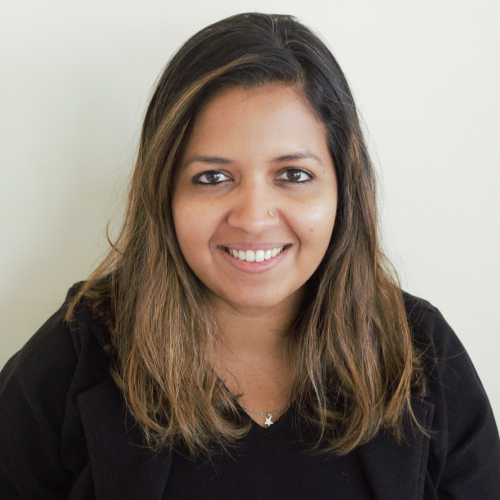
About Gina Dias
Gina Dias is a senior development, humanitarian, and peacebuilding professional with over 15 years of international experience working in diverse and complex contexts across Asia, Africa, and Europe. In her current role as Regional Programme Manager for Africa at the Peacemakers Network (Secretariat hosted by Finn Church Aid), Gina oversees the development and implementation of peacebuilding and conflict transformation initiatives together with Network members across the continent. Prior to her tenure with the Peacemakers Network and Finn Church Aid, Gina worked with the joint office of CAFOD, SCIAF, and Trocaire (CST) in Ethiopia, as well as Plan International and Oxfam in India. Gina holds a Bachelor’s in Politics from the University of Pune, India, and a Master’s in Comparative Politics from the London School of Economics and Political Science, U.K.
Follow the Peacemakers Network on social

